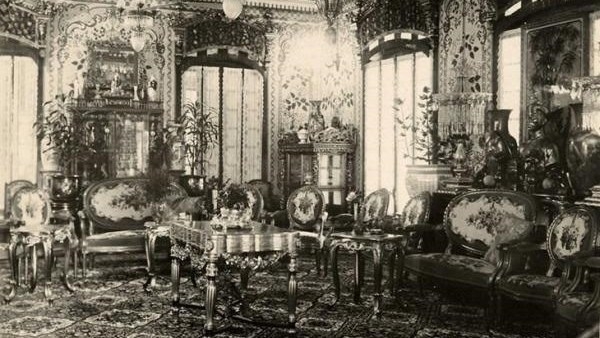
Hue city, the central province of Thua Thien-Hue, has announced plans to restore a palace in the former royal citadel in an attempt to give visitors a glimpse at how the former kings of the Nguyen Dynasty (1802-1945) lived.

The hall where King Bao Dai met the Japanese ambassador in 1945. (Photo: aavh.org).
The
People’s Committee of Thua Thien-Hue province recently approved funding of
VND123 billion (US$5.2 million) for the restoration of Kien Trung Palace inside
the dynasty’s imperial city.
It will be the first restoration project to
take place at the palace since it was destroyed in 1947 during the war. The Hue
Monuments Conservation Centre will oversee the project.
The centre’s director Phan Thanh Hai said a
plan had been drawn up using old images of the palace.
Starting later this year, the restoration project
will cover two storeys with three stone stairways carved with dragon designs as
well as a dragon embossment on the rooftop. The project is scheduled for
completion in 2020.
In the imperial city, Kien Trung Palace stood
behind the Thai Hoa Palace, which served as the main meeting hall for kings and
their mandarins.
The palace was the home of the dynasty’s last
kings, Khai Dinh and Bao Dai.
The palace was built in a mixture of French,
Italian Renaissance and old Vietnamese architectural styles by King Khai Dinh
in 1923. Earlier at the site, there was a pavilion built by King Minh Mang and
later repaired by King Tu Duc and King Duy Tan.
King Khai Dinh drew his last breath at the
palace in 1925. His son, King Bao Dai, lived in it with his first queen Nam Phuong.
Five of their children were born there, including two princes and three
princesses.
In March 1945, King Bao Dai met the Japanese
ambassador at the palace to announce Vietnam’s independence from French
colonialism.
Source: NDO
In the first 9 months of 2024, Hoa Binh province continues to implement the expanded tourism development cooperation program plan of 8 Northwest provinces with Ho Chi Minh City; deploying digital transformation content in tourism and developing a smart tourism province. Hoa Binh province received about 3.6 million views, an increase of 7.9% over the same period. In which, international visitors are about 380 visitors, domestic visitors are estimated at 3 million 220 visitors.
Spanning thousands of hectares and winding gracefully along mountain slopes, hillsides, and riverbanks, the terraced rice fields of Lac Son District present a stunning and captivating beauty. This region, renowned for its remarkable terraced landscapes, is also the centre of Hoa Binh Culture known for numerous archaeological sites.
The life of Mong people in Hang Kia and Pa Co communes of Mai Chau district has improved much thanks to tourism development.
The man-made Hoa Binh Lake, with a water surface area of approximately 9,000 hectares and a capacity of 9.45 billion cubic meters, stretches over 200 kilometers from Hoa Binh to Son La provinces. With the goal of developing into a national tourism area, the Hoa Binh Lake tourism area is expected to not only become the largest tourism centre in the province but also one of the 12 key tourist destinations in the northern midland and mountainous region of Vietnam.
Da Bia hamlet, now Duc Phong, in Tien Phong commune, Da Bac district, was once almost isolated from the outside as the only way to the hamlet was to get a boat ride across the Hoa Binh reservoir. However, as its tourism potential has been unleashed, the hamlet has established itself as one of the most attractive destinations on the tourism map. It has even received the ASEAN Community-Based Tourism Awards in 2019.
In the first 9 months of 2024, Mai Chau district, Hoa Binh province welcomed over 684 thousand visitors to visit and relax. In which, over 516 thousand domestic visitors and more than 168 thousand international visitors. Total revenue from tourism is estimated at over 821 billion VND.



